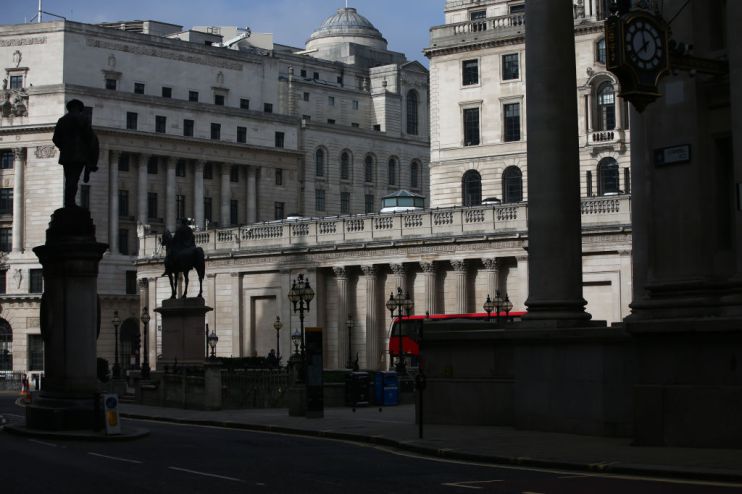FTSE 100 recovers after Bank of England holds interest rates

London stocks recovered this afternoon after suffering a drop following the Bank of England’s decision to hold interest rates indicated the pace of Britain’s economic recovery from the Covid-19 pandemic.
The BoE kept its stimulus programme unchanged this afternoon ahead of an expected recovery in Britain’s economy later this year, helped by the fast rollout of the nation’s vaccine programme.
It held interest rates at 0.1 per cent.
The BoE said outlook for the British economy “remains unusually uncertain” adding that “it continues to depend on the evolution of the pandemic, measures taken to protect public health, and how households, businesses and financial markets respond to these developments.”
The blue-chip FTSE 100 index was up 0.39 per cent this afternoon, buoyed by a 4.42 per cent jump in Informa’s share price after the events firm announced several of its Las Vegas conventions are scheduled to go ahead this year.
Sales, marketing and support services group DCC and Antofagasta, the mining company, also saw shares rise more than three per cent.
The FTSE 100 had fallen earlier this afternoon, dragged down by the BoE’s announcement and market updates from Ocado, BT and National Grid.
Ocado’s stock is down more than four per cent this afternoon despite its announcement this morning that revenue climbed 40 per cent in the first quarter.
Investors appeared dismayed at a drop in the number of orders placed in the first three months of the year, with the online shopping giant receiving on average 329,000 orders a week — down from 360,000 in the fourth quarter of 2020.
Meanwhile, BT shares are down 0.6 per cent – having fallen two per cent this morning – as Ofcom announced it will allow BT to make significant investments in nationwide full-fibre broadband because of the telecoms firm’s need for investments in infrastructure and upgrades.
Economists had widely expected the BoE to leave rates on hold at 0.1 per cent at its Monetary Policy Committee meeting today, while the asset purchase scheme is tipped to remain at £895bn.
“The US’s economic recovery is far stronger than that of the UK and as stated above, the Fed is not anywhere near tightening monetary policy so it is safe to say the BoE will be not be looking to adjust their stance in the foreseeable future,” said David Madden, analyst at CMC Markets.
Earlier this year, Andrew Bailey, the BoE chief, predicted the UK economy will contract by about four per cent in the first quarter but in light of the services PMI report for February, 49.5, the economic contraction “might not be that bad,” Madden noted.
A reading below 50.0 indicates negative growth but a report of 49.5 in the current restrictive climate seems relatively strong. Services account for approximately 70 per cent of UK GDP so perhaps the downturn in the first three months of the year won’t be too bad, he added.
In January, the British economy contracted by 2.9 per cent on a monthly basis, which was far better than the 4.9 per cent decline that economists were expecting.
In a recent interview with the BBC, Bailey said the UK economy might rebound quicker than initially thought.
“Britain’s vaccination scheme is one of the best in the world as in excess of 37 per cent of the population have been vaccinated, so the country is in a good position with respect to reopening the economy in the months ahead,” Madden explained.